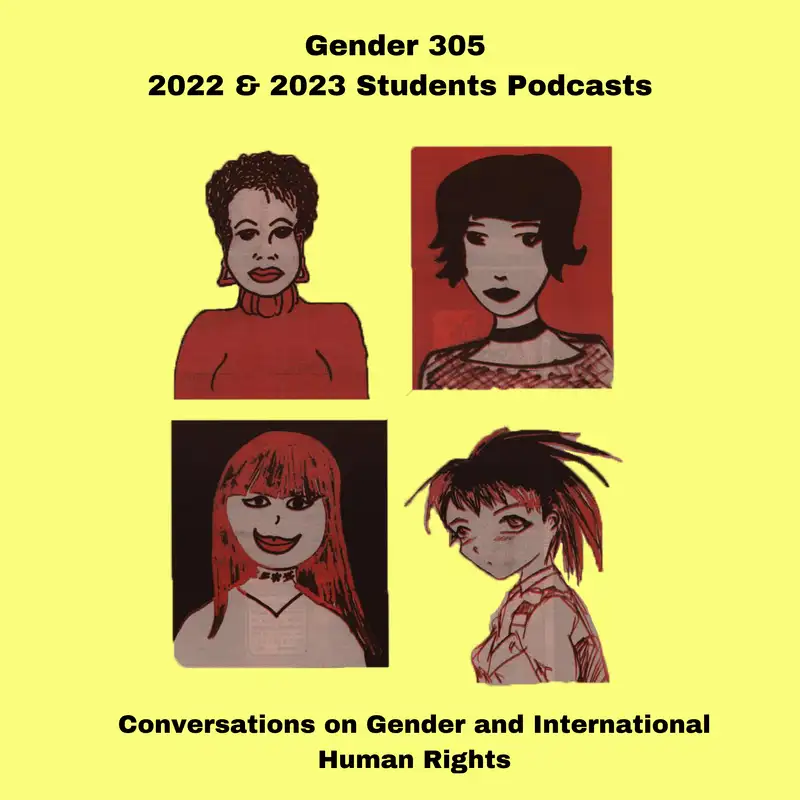The Overturning of Roe v. Wade: From a Critical Feminist Human Rights Perspective
Roe v.Wade was a landmark Supreme Court case brought in 1973. The ruling stated that undue State restriction of abortion before 24 weeks of pregnancy was unconstitutional. This ruling was recently struck down in 2022 with the Case Dobbs v Jackson Women’s Health Organization (Roe v. Wade, Encyclopaedia Britannica 2022). The overturning of Roe v. Wade does not only affect “women,” as there are other individuals who have abortions, such as transgender men, non-conforming individuals, and other gender diversities. To stay within the word count and the scope of this topic, we will use the umbrella term ‘women.’ However, it is essential to note the overturning of Roe v. Wade affects systematic and social discourse for everyone, regardless of gender, race, sexual identity or orientation.
Students discuss how this overturn was possible, looking at the history of opposing abortion rights in the USA. The primary opposition to abortion in the US looks at the issue through a religious, conservative framework. The Alliance Defending Freedom (ADF) who wrote the draft of the law that overturned Roe v Wade is a group with this perspective (How the Anti-Abortion Rights Movement Took Down Roe, Vice News 2022). This perspective fails to answer our question regarding the ethics of abortion, and why access to abortion should or shouldn’t be a human right. Religious conservative perspectives inadequately argue against abortion with appeals to emotion (Babies Deserve a Chance at Life, ADF 2022), and the misuse of scientific arguments. Our perspective does not deny the humanity of a fetus, or that a distinct human life begins at conception (Medicine and technology have shown us that every human life at EVERY stage deserves to be protected, ADF 2021). This is a misrepresentation of our argument and the science; while a distinct life begins at conception the same is not true for personhood. What we argue makes one a person and distinguishes us from animals is our consciousness (Kluge, 2013), which science actually shows us is an impossibility until 24 weeks of gestation (Lagercrantz, 2014, and Lagercrantz and Changeux, 2009). They also are inadequate to be applied at a human rights level as they require a religious faith in the inherent dignity of human fetuses, and thus fail to protect all individuals regardless of creed, sex, and race from the indignity of having their right to self-determination taken away. Their perspective is also vocally anti United Nations. Another Christian lobby group called C-Fam sees the CEDAW treaty body as an organization that threatens the US Constitution and state freedoms (Cedaw Reality Check, C-Fam). Students defend that human rights issues should be decided at the state level. To complement this conversation, they present how the United Nations human rights framework grounds the right of a woman to control the number and spacing of her children, and her right to access the healthcare required to do so (CEDAW, Articles 12 and 16). We argue that abortion is covered under such healthcare. The UN CEDAW treaty body could provide a legal basis for abortion rights, despite the fact that USA has not ratified it. Students also explore a deontological ethics approach as key to grounding the right to abortion and proving that a pro-choice perspective is a logical and scientific choice over a pro-life one. And finally, a critical race feminist approach allows to elaborate on the impacts this ruling has on racialized women. Since abortion is an issue regarding an individual's right to self-determination, American access to abortion coheres with a Deontological ethics approach. This is particularly relevant to the right a person has to bodily autonomy (Kluge, 2013). The Critical Race Feminist perspective is important when discussing the overturning of Roe v. Wade, given that women of colour are already discriminated against, and thus have lower access to proper health care. Women of colour face more dismissive treatment by medical professionals and unjust racial stereotypes, thus contributing to medical mistrust (Artiga et al., 2022).
References
Kluge, E. (2012, October 1). Ethics in Health Care: A Canadian Focus, First Edition (1st ed.). Pearson Education Canada.
Are Women Human?: And Other International Dialogues. (2007, November 30). In Crimes of War, Crimes of Peace (First PB Edition, First Printing). Belknap Press: An Imprint of Harvard University Press.
Artiga, S., Hill, L., Ranji, U., & Gomez, I. (2022, July 15). What are the Implications of the
Overturning of Roe v. Wade for Racial Disparities? KFF. Retrieved October 4, 2022, from https://www.kff.org/racial-equity-and-health-policy/issue-brief/what-are-the- implications-of-the-overturning-of-roe-v-wade-for-racial-disparities/
Assembly, U. G. (1979). Convention on the elimination of all forms of discrimination against
women. Retrieved April, 20, 2006.
Vice how the anti-abortion rights movement took down roe - Bing video. (n.d.). [Video]. Retrieved October 10, 2022, from https://www.bing.com/videos/search?q=vice+how+the+anti-abortion+rights+movement+took+down+roe
Babies Deserve a Chance at Life. (n.d.). Alliance Defending Freedom. Retrieved October 10, 2022, from https://adflegal.org/issues/sanctity-of-life/abortions/key-issues/babies-deserve-a-chance-at-life
[Alliance Defending Freedom]. (2021, November 29). Medicine and technology have shown us: EVERY human life at EVERY stage deserves to be protected. [Video]. YouTube. Retrieved October 10, 2022, from Medicine and technology have shown us: EVERY human life at EVERY stage deserves to be protected.
Brand, A. (2022, May 7).'we cannot go back': People share their stories of abortion and access. NBCNews.com. Retrieved October 9, 2022, from https://www.nbcnews.com/specials/abortion-and-access-stories-around-the-country/index.html.
Lagercrantz, H. (2014, October). The emergence of consciousness: Science and ethics.
In Seminars in Fetal and Neonatal Medicine (Vol. 19, No. 5, pp. 300-305). WB Saunders.
Lagercrantz, H., & Changeux, J. P. (2009). The emergence of human consciousness: from fetal
to neonatal life. Pediatric research, 65(3), 255-260.
Lewis, H. (1998). Global intersections: critical race feminist human rights and inter/national black women (2nd ed., Vol. 50). Marine Law Review.
OHCHR. (2022.). OHCHR | What are human rights? Retrieved October 4, 2022, from
User, S. (2014, October 20). CEDAW Reality Check. C-Fam. Retrieved October 10, 2022, from https://c-fam.org/cedaw-reality-check-2/
Roe v. Wade | Summary, Origins, & Influence. (2022, August 24). Encyclopedia Britannica. Retrieved October 10, 2022, from https://www.britannica.com/event/Roe-v-Wade
